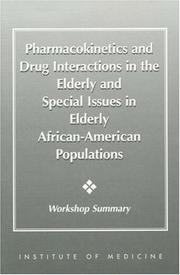| Listing 1 - 10 of 12 | << page >> |
Sort by
|
Book
ISBN: 0128236795 0128236809 9780128236802 9780128236796 Year: 2022 Publisher: Amsterdam, Netherlands : Elsevier,
Abstract | Keywords | Export | Availability | Bookmark
 Loading...
Loading...Choose an application
- Reference Manager
- EndNote
- RefWorks (Direct export to RefWorks)
Anti-Aging Pharmacology provides an overview of current research aimed at the pharmacological modulation of aging, including a discussion of the growing number of novel drug classes with promising anti-aging potential. The aging process is the main risk factor for all chronic diseases affecting the elderly. With lifespans extending across the globe, these chronic diseases are placing a larger burden on individuals and health care systems. Therefore, slowing down the aging rate could be more effective in delaying aging-associated chronic disorders than combating them one by one, which is the conventional approach in a current disease-based pharmacological paradigm. This book contains the work of the worlds leading researchers in the field, including sections on the conceptual and methodological background of anti-aging pharmacology, the basic classes of anti-aging drugs, phytochemicals, outcomes of anti-aging developments and future directions. This book will be of interest to a wide audience, ranging from pharmacologists, medicinal chemists and academic researchers in gerontology, biomedical sciences and those in medical practice. --
Aging --- Geriatric pharmacology. --- Pharmaceutical Preparations --- Longevity --- Geroscience --- Health aspects. --- Prevention. --- drug effects
Periodical
ISSN: 15567540 15292584 Year: 2000 Publisher: Providence, R.I. : Manisses Communications Group
Abstract | Keywords | Export | Availability | Bookmark
 Loading...
Loading...Choose an application
- Reference Manager
- EndNote
- RefWorks (Direct export to RefWorks)
Geriatric psychopharmacology --- Geriatric pharmacology --- Psychopharmacology --- Pharmacology --- Geriatrics --- Psychopharmacologie geriatrique --- Pharmacologie geriatrique --- periodicals. --- Psychopharmacology. --- Pharmacology. --- Geriatrics. --- Psychopharmacologie gériatrique --- Pharmacologie gériatrique --- Geriatric pharmacology. --- Geriatric psychopharmacology. --- Gériatrie. --- Personne âgée. --- Psychopharmacologie. --- Gerontology --- Pharmacologies --- Pharmaceutical Preparations --- pharmacology --- Pharmacy, Therapeutics, & Pharmacology --- Geriatrics..
Book
ISBN: 9781591952510 1591952514 Year: 2009 Publisher: Hudson : Lexi-Comp,
Abstract | Keywords | Export | Availability | Bookmark
 Loading...
Loading...Choose an application
- Reference Manager
- EndNote
- RefWorks (Direct export to RefWorks)
Pharmaceutical Preparations --- Drug Interactions --- Drug Therapy --- Aged. --- Drugs --- Geriatric pharmacology --- Posologie --- Pharmacologie gériatrique --- administration & dosage --- Dosage --- Handbooks, manuals, etc. --- Guides, manuels, etc. --- Pharmacologie gériatrique

ISBN: 0897668804 0897668812 Year: 1994 Volume: 717 Publisher: New York, NY : New York Academy of Sciences,
Abstract | Keywords | Export | Availability | Bookmark
 Loading...
Loading...Choose an application
- Reference Manager
- EndNote
- RefWorks (Direct export to RefWorks)
Aging --- Geriatric pharmacology --- Longevity --- Nootropic agents --- Brain Diseases --- Brain --- Molecular aspects --- Congresses. --- drug effects --- congresses. --- drug therapy --- Congresses --- Drug effects --- Drug therapy --- AGING --- BRAIN --- BRAIN DISEASES --- LONGEVITY --- DRUG EFFECTS --- DRUG THERAPY

ISBN: 0309058929 9786610187126 1280187123 0309562341 9780309562348 9780309058926 030917452X Year: 1997 Publisher: Washington, D.C. : National Academy Press,
Abstract | Keywords | Export | Availability | Bookmark
 Loading...
Loading...Choose an application
- Reference Manager
- EndNote
- RefWorks (Direct export to RefWorks)
Geriatric pharmacology --- Drug interactions --- Pharmacokinetics --- Older African Americans --- Adult --- African Continental Ancestry Group --- Kinetics --- Pharmacological Processes --- Pharmacological Phenomena --- Therapeutics --- Ethnic Groups --- Phenomena and Processes --- Biochemical Phenomena --- Population Groups --- Analytical, Diagnostic and Therapeutic Techniques and Equipment --- Age Groups --- Physiological Processes --- Continental Population Groups --- Persons --- Chemical Phenomena --- Named Groups --- Drug Therapy --- African Americans --- Drug Interactions --- Aged --- Medicine --- Health & Biological Sciences --- Geriatrics --- Age factors --- Medical care --- Drug use --- Geriatric pharmacology. --- Drug interactions. --- Age factors. --- Medical care. --- Drug use. --- African American aged --- African American older people --- Afro-American aged --- Older people, African American --- Age factors in pharmacokinetics --- Interactions, Drug --- Older people --- Aging --- Drugs --- Pharmacology --- Side effects

ISBN: 9782891302098 9782224029722 2891302095 2224029721 Year: 2007 Publisher: [Saint-Hyacinthe, Quebec] : [Paris] : Edisem Maloine,
Abstract | Keywords | Export | Availability | Bookmark
 Loading...
Loading...Choose an application
- Reference Manager
- EndNote
- RefWorks (Direct export to RefWorks)
Quatrième de couverture : "Les soins aux personnes âgées n'ont rien perdu de leur importance au cours des dernières années, bien au contraire. Les vieillards sont plus nombreux; ils vivent aussi plus vieux. Heureusement, les progrès en traitement et en prévention laissent espérer une certaine compression de la morbidité associée au vieillissement. Par ailleurs, malgré les pertes inéluctables qui accompagnent le grand âge, on tient un meilleur compte des réelles possibilités de croissance de l'être humain vieillissant, et le concept de «vieillissement réussi» a fait son apparition. Au plan technique, on enregistre des progrès intéressants qui facilitent le diagnostic et améliorent le traitement des maladies. Les nouveautés en imagerie médicale,, des interventions moins invasives en cardiologie ainsi qu'une pharmacothérapie plus ciblée et de moins en moins toxique en constituent les meilleurs exemples. Pour les cliniciens, cependant, la gériatrie devient de plus en plus complexe, tant par l'accroissement des connaissances que par les enjeux éthiques et cliniques que pose chaque avancée technique. La fin de vie s'allonge. Est-ce toujours pour le mieux? Les cliniciens sont constamment confrontés à la prévalence élevée d'incapacités physiques, de problèmes cognitifs et de syndromes psychiatriques divers. Il faut non seulement s'occuper au mieux du malade, mais aussi se soucier bien davantage du vécu des proches. Les ressources se font rares et il faut savoir les utiliser de manière, judicieuse en travaillant sans cesse à améliorer l'efficacité des services. Enfin, plus on approche de la fin de vie, plus les objectifs de soins doivent être individualisés. Les intervenants doivent donc non seulement maîtriser leur principale mission qui est d'ajouter de la vie aux années, mais aussi, devant l'inéluctabilité de la mort, améliorer leur expertise en soins palliatifs afin de contribuer à une fin de vie digne et paisible. Depuis vingt ans, le PRÉCIS PRATIQUE DE GÉRIATRIE a offert aux professionnels de la santé un outil de formation et de référence sur les spécificités de l'approche gériatrique. Les lecteurs ont semblé apprécier sa forme didactique et l'abondance d'algorithmes et de tableaux qui permet une référence rapide. Pour cette troisième édition, une vingtaine de nouveaux chapitres ont été ajoutés, et la majorité des autres a été profondément remaniée. Les auteurs ont conservé la même formule qui consiste à rassembler, en un tout homogène, le fruit de la réflexion et de l'expérience de plus d'une centaine de collaborateurs et collaboratrices de toutes disciplines choisis pour leur compétence et leur étroite implication dans l'intervention auprès des personnes âgées."
Geriatrics --- Aging --- Geriatrics. --- Geriatric psychiatry. --- Geriatric pharmacology. --- Aging. --- Chronically ill --- Older people --- Gériatrie --- Gérontopsychiatrie --- Pharmacologie gériatrique --- Vieillissement --- Malades chroniques --- Personnes âgées --- Medical care. --- Mental health --- Soins médicaux --- Santé mentale --- Chronic Disease --- Geriatric Psychiatry --- Geriatrie --- Gerontopsychiatrie --- Pharmacologie geriatrique --- Personnes agees --- Soins medicaux --- Sante mentale --- Gériatrie --- Gérontopsychiatrie --- Pharmacologie gériatrique --- Personnes âgées --- Soins médicaux --- Santé mentale
Book
ISBN: 303128061X 3031280601 Year: 2023 Publisher: Cham : Springer International Publishing : Imprint: Springer,
Abstract | Keywords | Export | Availability | Bookmark
 Loading...
Loading...Choose an application
- Reference Manager
- EndNote
- RefWorks (Direct export to RefWorks)
This book summarizes the broad and rapidly evolving field of geriatric pharmacotherapy, which is becoming increasingly relevant for practicing physicians who care and prescribe medications for older patients. Around the globe, ageing populations are associated with an increased prevalence of chronic diseases. Older adults are often affected by multimorbidity, i.e., suffer from more than one chronic disease. The main consequence of multimorbidity is polypharmacy, which is commonly defined as the regular use of five or more medicines. Polypharmacy has now reached epidemic proportions in our societies, and is associated with an increased risk of drug-drug interactions, drug-disease interactions and adverse drug reactions. The management of polypharmacy in older patients with complex multimorbidity poses several challenges and needs to be based on specific knowledge and prescribing expertise. The aim of this book is to provide a comprehensive update on the field, and to share the expertise needed to optimize the management of pharmacotherapy in older patients.
Geriatric pharmacology. --- Pharmacology --- Geriatrics. --- Primary care (Medicine). --- Pharmacology. --- Nursing. --- Primary Care Medicine. --- Clinical nursing --- Nurses and nursing --- Nursing process --- Care of the sick --- Medicine --- Drug effects --- Medical pharmacology --- Medical sciences --- Chemicals --- Chemotherapy --- Drugs --- Pharmacy --- Primary medical care --- Medical care --- Gerontology --- Older people --- Physiological effect --- Diseases --- Health and hygiene
Book
ISBN: 9782876716315 Year: 2020 Publisher: Paris : Editions Frison-Roche,
Abstract | Keywords | Export | Availability | Bookmark
 Loading...
Loading...Choose an application
- Reference Manager
- EndNote
- RefWorks (Direct export to RefWorks)
Geriatric pharmacology --- Older people --- Drug Therapy. --- Aged --- Geriatrics --- Drug Prescriptions. --- Cardiovascular Diseases --- Cardiovascular Agents --- Médicaments gériatriques --- Médicaments de l'appareil cardiovasculaire --- Personnes âgées --- Diseases --- Chemotherapy. --- therapy. --- drug therapy. --- administration & dosage. --- Prescription médicamenteuse. --- Prescription. --- Maladies --- Chimiothérapie.
Book
ISBN: 1603274561 160327457X Year: 2010 Publisher: New York : Springer,
Abstract | Keywords | Export | Availability | Bookmark
 Loading...
Loading...Choose an application
- Reference Manager
- EndNote
- RefWorks (Direct export to RefWorks)
Medication use is the predominant form of health intervention in our society. And as we age, the likelihood of medication use increases dramatically, with more than 80 percent of those over age 65 using one or more medications. Along with that, the potential for medication errors also increases. Indeed adverse drug reactions (ADRs) and adverse drug events (ADEs) are a significant problem in older adults. Written in a practical format by contributors from Australia and the United States, Medication Management in Older Adults: A Concise Guide for Clinicians presents the available evidence on research interventions designed to reduce the incidence of medication errors in older adults, with a focus on acute, subacute, and residential (long-term) care settings. Because medication errors can occur at all stages in the medication process, from prescription by physicians to delivery of medication to the patient by nurses, and in any site in the health system, it is essential that interventions be targeted at all aspects of medication delivery. Chapters cover the principles of medical ethics in relation to medication management; common medication errors in the acute care sector; medication management in long-term care settings; nutrition and medications; the outcomes of a systematic review; dose form alterations; Electronic Health Records (EHR), Computerized Order Entry (COE), Beers criteria; and pharmacokinetics and pharmacodynamics. For those clinicians especially concerned with providing the best possible outcomes for their older adult patients, Medication Management in Older Adults: A Concise Guide for Clinicians is an invaluable resource and a significant contribution to the burgeoning literature on medication errors.
Geriatric pharmacology. --- Home care services -- Quality control. --- Medication errors -- Prevention. --- Older people -- Drug use. --- Older people -- Home care. --- Medication errors --- Older people --- Geriatric pharmacology --- Adult --- Patient Care Management --- Medicare Part D --- Pharmaceutical Services --- Drug Therapy --- Medical Errors --- Health Services --- Medicare --- Therapeutics --- Age Groups --- Insurance, Pharmaceutical Services --- Health Services Administration --- Medication Therapy Management --- Medication Errors --- Aged --- Insurance, Health --- Health Care --- Analytical, Diagnostic and Therapeutic Techniques and Equipment --- Health Care Facilities, Manpower, and Services --- Persons --- Named Groups --- Insurance --- Financing, Organized --- Economics --- Health Care Economics and Organizations --- Medicine --- Health & Biological Sciences --- Pharmacy, Therapeutics, & Pharmacology --- Geriatrics --- Prevention --- Drug use --- Management --- Medical errors. --- Errors, Medical --- Medical mishaps --- Mishaps, Medical --- Medicine. --- Internal medicine. --- Geriatrics. --- Medicine & Public Health. --- Geriatrics/Gerontology. --- Internal Medicine. --- Pharmacology --- Errors, Scientific --- Practice --- Medicine, Internal --- Gerontology --- Diseases --- Health and hygiene
Book
ISBN: 0128172762 0128164859 9780128172766 9780128164853 Year: 2019 Publisher: London, England : Academic Press,
Abstract | Keywords | Export | Availability | Bookmark
 Loading...
Loading...Choose an application
- Reference Manager
- EndNote
- RefWorks (Direct export to RefWorks)
Geriatric pharmacology. --- Drug delivery systems. --- Therapeutics, Experimental. --- Drug Delivery Systems. --- Aging --- Life Expectancy. --- Geriatrics --- physiology. --- methods. --- Life Extension --- Years of Potential Life Lost --- Expectancies, Life --- Expectancy, Life --- Life Expectancies --- Longevity --- Mortality, Premature --- Drug Targeting --- Delivery System, Drug --- Delivery Systems, Drug --- Drug Delivery System --- Drug Targetings --- System, Drug Delivery --- Systems, Drug Delivery --- Targeting, Drug --- Targetings, Drug --- Dosage Forms --- Experimental therapeutics --- Medicine, Experimental --- Delivery systems, Drug --- Drug administration technology --- Drug delivery technology --- Drugs --- Pharmaceutical technology --- Pharmacology --- Delivery systems
| Listing 1 - 10 of 12 | << page >> |
Sort by
|

 Search
Search Feedback
Feedback About UniCat
About UniCat  Help
Help News
News